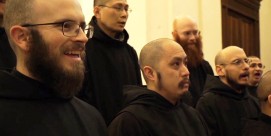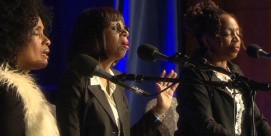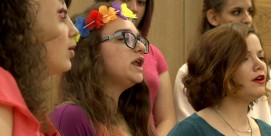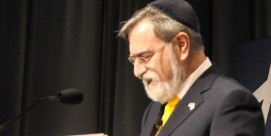In This Episode << SLIDE LEFT TO SEE ADDITIONAL SEGMENTS
Shlomo Carlebach
BOB ABERNETHY, anchor: We remember the Holocaust today with a profile of the late Rabbi Shlomo Carlebach, a Jewish troubadour in the 1960s and ’70s who preached love and peace and whose music has become a staple of religious observances in Jewish synagogues and homes. Carlebach was a Holocaust survivor who refused to lose his faith in God and in humankind. Our reporter is Menachem Daum, in New York. He says every melody in this story was composed by Shlomo Carlebach.
Rabbi SHLOMO CARLEBACH: After the Holocaust it’s so easy to be angry at the world, and it’s so easy to condemn the world. But we have to continue to love the world. We have to.
MENACHEM DAUM: In response to the Holocaust, Rabbi Shlomo Carlebach stressed the power of joy and the ability of every individual to become God’s partner in fixing the world.

Shlomo Carlebach in Poland |
Voice of Rabbi CARLEBACH: The most important thing today every person has to do is to cleanse their hearts from anger, and the only way of getting rid of anger is when you fill your heart with a lot of joy.
DAUM: Carlebach was quite unorthodox for an Orthodox rabbi, giving up the pulpit to spread his message through music. While often at odds with the Jewish establishment, alienated young Jews of the ’60s and ’70s responded to his universal teachings, and he became known as the “rebel rabbi” of the Jewish counterculture.
Rabbi CARLEBACH (clip from concert, singing “The Song of Sabbath”): Let’s teach the whole world to sing a song of Shabbos. In cold Siberia this is what keeps them warm. They sing a song of Shabbos.
(in interview): It has to be so strong, this Jewishness, that nothing in the world should move them, to un-Jewish them. But, on the other hand, it has to be completely connected to every human being in the world.
Professor ARI GOLDMAN (Columbia University Graduate School of Journalism): Shlomo had some way to electrify people and to inspire people. He felt, you know, one person at a time he could change things.
CONCERT ANNOUNCER: Let’s hear it for Shlomo Carlebach and Ritchie Havens.
(Clip of Shlomo Carlebach and Ritchie Havens in Crown Heights, New York concert)

Monika Krajewska |
DAUM: Shlomo devoted much of his final years to improving the relationship between Jews and others. He was determined that hatred should never be passed on to new generations. He gave this message to both Jews and non-Jews in such places as Israel, Russia, Germany, and Poland. Many Jews, especially Holocaust survivors from Poland, condemned Carlebach for reaching out to the Polish people.
VOICE OF JEWISH SURVIVOR: They had hatreds towards the Jews. How can you make peace in a situation like that?
Rabbi CARLEBACH (on bus tour): I bet you know we are coming to Poland, and it’s like we have the privilege of the Polish people look at us. So maybe we can really bring them a little message from heaven that there’s hope for the world, because everybody wants the world to be better. Nobody wants the world the way it is. The only thing is nobody shows them a picture of a better world. If we can walk around and show them some good pictures — you know, the best picture is the way one human being greets another. That’s all there is to it.
(singing during concert in Poland): You know, my beautiful friends, I’m the first time in Poland, and I had the sad privilege to be in Maidanek. But when I walked away I was full of hope.
CAMP GUIDE: They shot 18,000 Jews in Maidanek in one day and burned the bodies.
Rabbi CARLEBACH (singing during concert in Poland): When I walked the gas chambers it was clear to me — dawn is breaking. I want you to know, my beautiful friends, don’t ever give up on the world. Don’t ever give up on any human being, because we all are God’s image.

Professor Ari Goldman |
MONIKA KRAJEWSKA (Artist and Writer): We are Polish Jews, and we have Polish friends, and many of those friends fell in love with Rabbi Carlebach. This is simply because of his message of love and peace. And it’s not words like you read in the newspaper or statements made by politicians. But you feel it.
(1995 clip of Pope John Paul II in Giants Stadium listening to performance of Shlomo Carlebach’s song “Because of My Brothers and Friends”)
DAUM: Rabbi Carlebach died in 1994. A year later, his song of peace that he sang at every concert was chosen to honor Pope John Paul II.
NESHAMA CARLEBACH (Rabbi Carlebach’s daughter at the Hebrew Institute of Riverdale performs “Because of My Brothers and Friends” during a Martin Luther King Day concert): I think my father would have loved it. I think he would have loved just the feeling of the worlds coming together, because that’s really what Martin Luther King was wanting to accomplish and definitely what my father was wanting to accomplish.
Prof. GOLDMAN: The Jewish world embraced him after his death. When he was alive he was often a pariah, and I don’t think anyone could have imagined the kind of impact that his music would continue to have these many years after his death. It’s remarkable.
Voice of Rabbi CARLEBACH: This person asks me, “What’s your message?” So I said my message is nothing you don’t know. The only thing is we got to do it. Everybody knows it, but we never do it. My message is that there’s one God. We are one world. We are all brothers and sisters.
For RELIGION & ETHICS NEWSWEEKLY, this is Menachem Daum.







